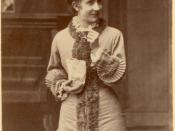A Feminine Transformation
Society has and may always reflect the gender specific point of view of man, for every facet of society has been tainted with masculinity. The laws of the land and the generally accepted civilized behavior all remain unconsciously over powered by the male perspective. In this male driven society, where does the female stand, how do society and the law judge a female? This was the point that Henry Ibsen brought to light in the play "A Doll House". Nora is a representation of the female conscience struggling to make sense of a male world.
Throughout the first scene Nora is portrayed as the perfect wife. She is beautiful and charming, everything a powerful man like Torvald could ever want in a trophy wife. He just loves showing her off to all of his friends and finds it especially stimulating when Nora dances the Taruntella, a dance that signifies her own dying as an individual.
Aside from how Nora is described physically, she is extremely subservient and consistently talked down to by Helmer. She is treated like a child and Helmer clearly possesses a strong hold over her life. Helmer says to Nora, "Don't deny it, my dear little Nora. Spendthrifts are sweet, but they use up a frightful amount of money. It's incredible what it costs a man to feed such birds."(45) Torvald sees Nora as nothing more than an enjoyment he can afford while Nora has no choice but to comply with his whims and fancies.
Although on the surface of Nora's character lies the stereotypical rich man's wife, her past actions reveal another side of personality. Nora had previously taken out a loan from Mr. Krogstadt by forging a note with her father's name. This is a serious crime...


